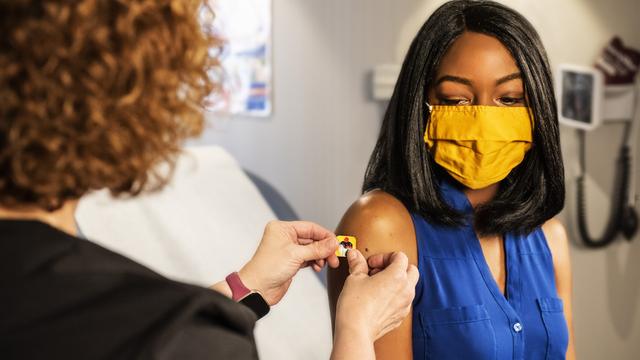The 5th wave generates an increase in infections and hospitalizations in France.What impact could have the generalization of the vaccination recall dose on this new peak?
Modeling projecting the short and medium term future of the epidemic in France, this is what the Pasteur Institute offers in a report published on November 29, 2021 and entitled "Impact of the decrease in immunity and the vaccination recall onThe COVID-19 epidemic»».How generally the recall doses in France are changing things?And more specifically, to what extent can they slow down admissions to the hospital?
The Pasteur Institute alerts that its modeling comes from the data available at this precise moment and that this can evolve.The principle of a scenario is that it extrapolates the present, but during this epidemic, the present changes fairly quickly.Projections do not take into account, for example, the potential that the omicron variant spreads (we do not know, at present, if it is really more contagious and/or more virulent).
An efficiency of 95 %
Beforehand, Pasteur hypothesizes a strengthening of barriers (ventilation, masks, physical distancing, telework) in French society at the end of November.If this "hypothesis of strengthening protective behavior" is confirmed, epidemiologists believe that we can hope for a 10 % reduction in transmission rates from December 1 (this Wednesday)."A very small reduction in transmission rates could produce a significant decrease in the size of the epidemic peak.The strengthening of barriers, wearing the mask, teleworking and a reduction in contacts can play an important role in the dynamics of the epidemic, "warn epidemiologists.

Regarding the recall dose, the Pasteur Institute postulates that, taking into account current data, we know that the vaccination efficiency against infection falls from 80 % to 50 % after 6 months, and that the capacity of vaccines to brakehospitalizations drops from 95 % to 85 % after this same period.In their reference scenario, epidemiologists of the Institute note that the recall dose makes it possible to reach an efficiency of 95 % as a whole: "After a dose of recall, the vaccination efficiency against infection increases to 95% (85 % after 6 months on average) and efficiency against hospitalization is 95 % stabilized.»»
By reporting this effectiveness of the recall with the current epidemic wave, the Institut Pasteur was able to draw up a scenario on the impact of this strategy to curb the peak.In a scenario where there would be around 400,000 doses injected each day, with a rule of 5 months of delay between the last dose dose and the dose of recall, then the peak of hospitalizations is reduced by 44 % if the recall targetspeople over 18, as is the case now.If the strategy was only open over 50 and over, this figure would fall to 33 %, and 20 % if it only targeted people aged 65 and over.
Pour aller plus loinCombien de temps mon pass sanitaire est-il valide sans dose de rappel ?The recall dose would stabilize the situation
In a graph provided by the Pasteur Institute, we can also see that according to these projections, an optimistic scenario and a pessimistic scenario coexist:
: Vaccination efficiency against infection (left column) and hospitalization (right column) after two doses (full lines) and after the recall (dotted lines) in the optimistic (top line) and pessimistic (line of the linelow).
Source: Institut Pasteur
In the pessimistic scenario, after two doses, protection against hospitalizations is more than 65, and decreases overall for all age groups.The same goes for the ability to curb infections, where a pessimistic scenario shows a faster and clearer drop in protection after two doses.
However, in the two scenarios, the dose of recall stabilizes the situation: whether in the optimistic or pessimistic scenario, the dose of recall maintains 95 % protection against infections and against hospitalizations.
Understand everything at the vaccine
